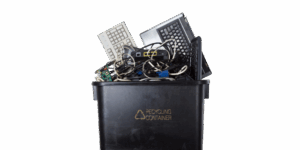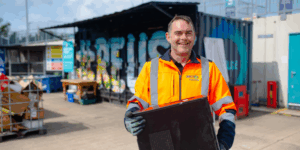Windows 10 End of Life and IT Recycling

On 14 October 2025, Microsoft will officially end support for Windows 10. With more than a billion devices worldwide still running Windows 10, the transition to newer systems is set to create one of the largest waves of IT upgrades in history. That means an unprecedented surge in redundant hardware — and a critical question for businesses:
How will your business dispose of outdated IT equipment securely, responsibly, and sustainably?
Windows 10 End of Life and IT Recycling

What Windows 10 end of life means
From 14 October 2025, Microsoft will no longer provide security updates, bug fixes, or technical support for Windows 10. While devices will still function, they will quickly become vulnerable to cyberattacks and non-compliant with data protection standards.
Organisations face three main options:
1) Upgrade to Windows 11, if your hardware meets the minimum requirements.
2) Purchase Extended Security Updates (ESU) for up to three years, at escalating costs.
3) Replace devices entirely, which for many businesses will be the most practical solution.
It is this third option that will drive a dramatic increase in demand for IT recycling and asset disposal services.
Learning from the past
The end of support for Windows 10 is not the first time software retirement has reshaped the IT landscape — and it won’t be the last.
When Windows XP (2014), Windows 7 (2020), and Windows 8.1 (2023) reached end of life, millions of devices were suddenly at risk, forcing businesses and public organisations to replace hardware that could no longer run newer systems.
Each of these transitions created spikes in e-waste, underlining the critical importance of planning for secure, sustainable IT asset disposal.
The IT recycling challenge
Replacing thousands of computers will result in a huge volume of redundant IT hardware. If not handled correctly, this could create a spike in e-waste, with harmful materials ending up in landfills.
The problem is already significant: Europe is one of the largest producers of e-waste per capita in the world (17.6kg per capita as referenced in the Global e-waste monitor 2024). The Windows 10 deadline risks accelerating this trend unless organisations adopt sustainable and compliant recycling solutions.
But IT recycling isn’t just about the environment — it’s also about data security. Redundant devices often contain confidential business information, customer records, and intellectual property. Simply throwing them away or using a non-accredited recycler exposes organisations to data breaches, regulatory penalties, and reputational harm.
Why accredited IT recycling matters
To manage the consequences of Windows 10 end of life effectively, businesses need an IT recycling partner that is:
Accredited and certified
Ensuring data is securely destroyed and equipment is handled to the highest environmental standards. Certifications such as ISO 27001 demonstrate robust processes.
Focused on reuse as well as recycling
Where possible, devices should be refurbished and given a second life, extending value and reducing environmental impact.
Transparent and traceable
With audit trails and certificates of destruction, so businesses can prove compliance with GDPR and other regulations.
Delivering social value
Responsible IT recycling can support local jobs, training opportunities, and community reuse projects.

How Bristol Waste can help
At Bristol Waste, our commercial team and ITAD technicians are ready to support businesses through the challenges of Windows 10 end of life with secure IT recycling and disposal services:
Data security first:
Certified data erasure and destruction to protect your organisation.
Environmental responsibility:
Maximising reuse and recycling, and preventing e-waste from reaching landfill.
Social value delivery:
Reinvesting millions into Bristol, supporting local jobs and apprenticeships, and supplying affordable refurbished equipment through our Reuse Shops across Bristol and Digital Inclusion Scheme.
Dedicated support:
Tailored account management to help your business manage the transition smoothly and cost-effectively.
The Windows 10 end of life in October 2025 will create one of the largest IT transitions ever seen. Without planning, it risks unleashing a surge of e-waste and exposing businesses to serious security threats. With the right approach, however, it can be a catalyst for positive change — strengthening data protection, cutting carbon impact, and delivering social value through responsible IT recycling.
At Bristol Waste, we combine accredited IT asset disposal with a commitment to Bristol’s people and environment.
If your organisation is preparing for Windows 10 end of life, now is the time to act. Contact us today to discuss your IT recycling and disposal needs.
Together we make tomorrow safer, cleaner, and more sustainable.
